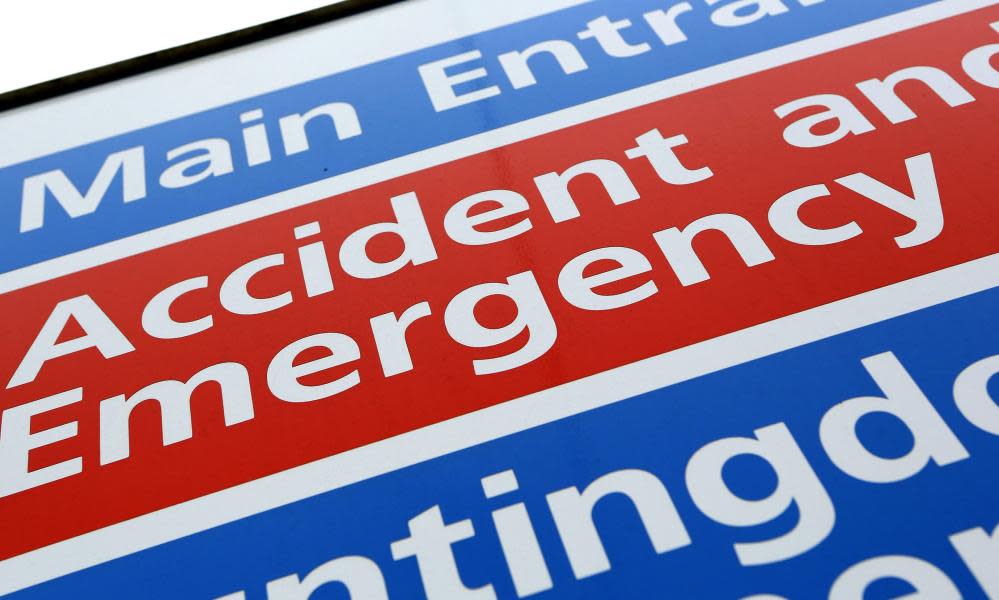A&E appointments system proposed in NHS targets shakeup

Patients could have to start booking appointments in A&E units, and those with only minor ailments wait many hours before they are seen, under a proposed shakeup of NHS targets.
NHS England chiefs are examining whether to relax the longstanding obligation to see 95% of A&E patients within four hours.
They are also under growing pressure from hospital bosses to ease another key NHS waiting time target – the duty to give patients non-urgent surgery within 18 weeks of being referred by their GP.
NHS England is reviewing its major service-wide treatment targets and will include any changes in its forthcoming 10-year plan. This will spell out how it will spend the extra £20bn it is due to receive by 2023.
It is studying the operation of urgent and emergency care services in parts of Denmark where all but the most ill patients are expected to ring to make an appointment at an A&E unit. If adopted in England, it would force many of the 22 million visitors to A&E every year to pre-book before arriving.
A senior NHS source close to the discussions said: “If you book an appointment you are seen within four hours. If you just turn up and are very sick you are seen immediately.
“But if you just turn up with your sore finger, your headache or your sprained ankle and are seen within four hours then that’s great. But you are taking pot luck. So a blended model with booked emergency departments might be something worth considering.”
Professor Keith Willett, NHS England’s director of acute care, is keen on switching to an appointments system. But A&E staff say it is unclear who would triage – assess – patients who ring.
The adoption of the system in Copenhagen in 2014 led to complaints that patients faced long delays getting through to phonelines and that some serious injuries and illnesses were misdiagnosed because the assessor had no contact with the patient.

But the Royal College of Emergency Medicine, which represents A&E doctors, rejected the idea. “I would be very surprised if this worked in the NHS. The NHS is filled with innovative ideas that crash and burn,” said its president, Dr Taj Hassan.
NHS bosses should focus instead on tackling understaffing, and the threat to patients’ safety posed when hospitals can no longer meet the four-hour target, Hassan added.
Meanwhile, hospital bosses want to see the 18-week target for planned surgery, such as hip and knee replacements and cataract removals, watered down.
One senior NHS leader, who asked not to be named, said understaffing and financial problems meant hospitals could no longer meet the four-hour A&E target, 18-week standard for planned care and a series of targets covering cancer treatment. “That’s not [all] deliverable,” he said.
One trust chief executive said that faced with “really, really difficult decisions” about which targets to focus on, cancer was “absolutely” a priority, alongside A&E performance.
However, they added: “But we are now looking at our elective programme … we will never deliver [the 18-week target] ever again.”
More hospitals have been missing one or more of the three main targets in recent years as deepening staffing problems have coincided with a rising demand for care. The number of patients on the NHS waiting-list for planned surgery recently hit 4.2 million – the highest for 10 years.
Chris Hopson, chief executive of NHS Providers, which represents NHS trusts, said many hospitals had already downgraded the 18-week target because that was the best approach based on medical need.
“Trusts rightly prioritise according to clinical need and, in practice, given the range of pressures facing the service, this can currently mean slipping elective surgery performance despite the potential adverse consequences for patients,” said Hopson.
“The forthcoming NHS long-term plan must be ruthlessly honest about what can be achieved for the available money and what the priorities should be.”
But Nigel Edwards, chief executive of the Nuffield Trust thinktank, said the 18-week target should stay.
“If we cannot take people off the waiting list as fast as they are put on it, waiting times won’t just simply stay a bit above 18 weeks. They will keep getting worse and worse. That matters a lot to patients, and might cost even more as people’s conditions worsen.”

 Yahoo News
Yahoo News 
